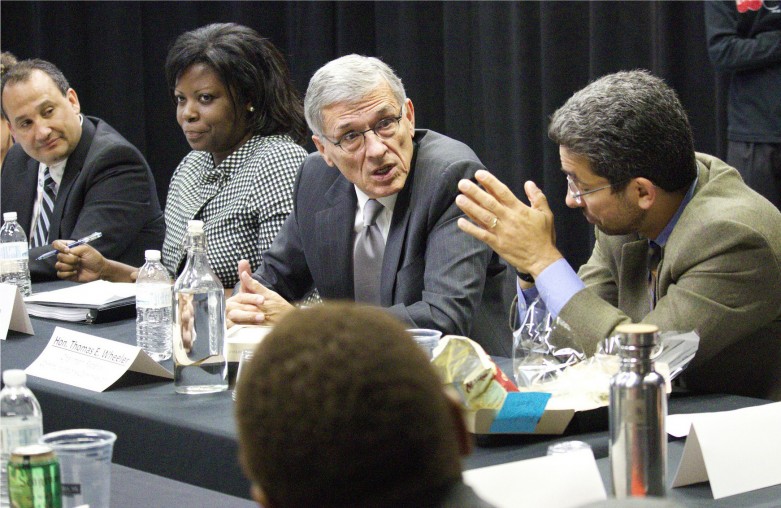
Wheeler Has a Lot to Say --- But Not in Public
FCC Chairman Tom Wheeler recently visited Philadelphia to participate in two closed meetings with community leaders on diversity in media ownership and Internet access in schools and libraries. The organizers at the Media Mobilizing Project hosted and coordinated the visit.
MMP had hoped to hold a big public forum, but as Wheeler came under fire from supporters of Net Neutrality and opponents of the Comcast-Time Warner Cable merger, his staff pushed the group to organize private roundtables instead.
I attended both meetings, and participants represented a small but diverse cross-section of Philadelphia: The group included digital access trainers, taxicab union leaders, professors, operators of independent African American-owned radio stations, working parents, high-school students and librarians.
The first meeting was held at PhillyCAM, a community media organization that operates the city’s public-access channels. Around a dozen people gathered to discuss diversity in media ownership.
Wheeler talked about the need to get rid of loopholes that allow companies to evade ownership limits. After hearing powerful stories from minority-owned radio and cable operators struggling to keep their businesses afloat, Wheeler noted the importance of expanding and protecting media ownership by women and people of color — promising there would be more diverse owners when he leaves office than when he began his tenure as chairman.
Whenever people brought up Net Neutrality and the merger, Wheeler steered us back to neutral ground with comments like “It’s a complicated issue” and “We try to make decisions according to the mandate of this fuzzy thing called the public interest.”
People nonetheless expressed concerns about how the merger might impede free speech, competition and access, and noted that Comcast’s poor track record in its hometown of Philadelphia makes it clear it’s not a good corporate citizen.
A second meeting took place at the Free Library, where we talked about what the FCC can do to expand Internet access.
A mom who lends her home computer to kids who need to go online to do schoolwork emphasized the need to increase access to members of underserved communities. Wheeler agreed but said that the law as written meant the FCC couldn’t guarantee access to sites other than schools, libraries and tech-mobiles. As Wheeler noted, this is a “hinge moment” in history: If universal access to the Internet isn’t secured, entire generations could fall behind.
This is a hinge moment for other reasons too. If Wheeler ignores the public opposition to his Internet rules and the Comcast merger, the Internet we love will cease to exist. This is why it’s more crucial than ever for the FCC to hold public hearings — to engage face to face with the people its decisions impact.
While Wheeler may forget it at times, the FCC is supposed to make decisions based on the public interest; it’s supposed to heed the public, not just the cable and telecom lobbyists that constantly knock on its door in D.C. Fellow FCC Commissioner Jessica Rosenworcel said the agency needs to be more accessible, but Wheeler calls the shots here.
While Free Press and other groups have pushed him for months to hold public hearings, so far Wheeler’s refused to budge. He prefers closed-door gatherings where he can control the conversation to large-scale meetings where anyone can weigh in.
Enough already: We need to see Wheeler and his fellow commissioners in communities around the country. They need to hear from thousands — not dozens — of people before they vote on issues that will impact the future of the Internet. If the FCC doesn’t adopt the right policies now, this “hinge moment” will mean a turn for the worse.
Add your voice to the mix today and demand that the FCC hold public hearings before it votes on Wheeler’s flawed Internet proposal and the Comcast-Time Warner Cable merger.